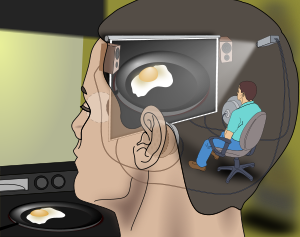
Back Karteziánské divadlo Czech Cartesianisches Theater German Teatro cartesiano Spanish Kartesiolainen teatteri Finnish Théâtre cartésien French カルテジアン劇場 Japanese Cartesiaans theater Dutch Картезианский театр Russian 笛卡爾劇院 Chinese

"Cartesian theater" is a derisive term by philosopher and cognitive scientist Daniel Dennett, made known in his 1991 book Consciousness Explained, to refer pointedly to a defining aspect of what he calls Cartesian materialism, which he considers to be the often unacknowledged remnants of Cartesian dualism in modern materialist theories of the mind.
Dennett's former teacher Gilbert Ryle, in his book The Concept of Mind (1949), had also ridiculed the conception of the mind as a "private theater" or "second theater" in Cartesian dualism.[1]
- ^ Caston, Victor (2021). "Aristotle and the Cartesian theatre" (PDF). In Gregoric, Pavel; Fink, Jakob Leth (eds.). Encounters with Aristotelian Philosophy of Mind. New York: Routledge. pp. 169–220 (footnote 1). doi:10.4324/9781003008484-11. ISBN 9780367439132. OCLC 1223014825.